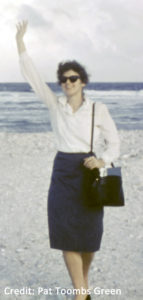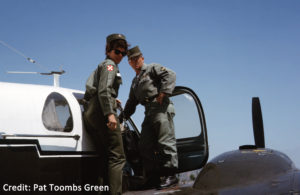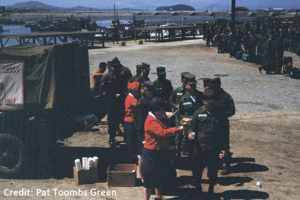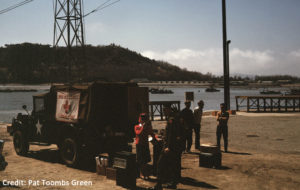In our 60th edition of the Donut Dollie Detail, Pat explains that the lure of travel prompted her to join the SRAO’s Clubmobile program, that being a California native she unexpectedly had to get snow boots when she arrived in Korea, and that the women who served in Korea were patriotic and eager to serve.
Please share the Donut Dollie Detail with family, friends and veterans you may know, and make sure to like/follow us on Facebook to learn when the next edition is posted.
Please meet Red Cross Donut Dollie Pat Toombs Green…

What prompted you to join the SRAO (Supplemental Recreation Activities Overseas) program and want to go to Korea?
I wanted to travel after college, and this job offered a short term commitment, even though the Peace Corps was just starting as well. I think my parents felt a little better knowing I’d have one foot on American soil on military bases supervised by the Red Cross.
When and where were you stationed in Korea? Did you go by a nickname?
I was stationed at Camp Pelham, which was First Cav Division, then ASCOM CITY (Army Support Command). I regret I don’t remember my third assignment. I tried to go on line to check out names, but often we knew the names of the military units, not the official name of the installation. I was in Korea from November, 1962 to February, 1964. My nickname was Toombsie.
————————————————————————————————————————–
What was a routine day like in Korea?
Since Korea was on Armistice status, rather than active fighting, our days were fairly routine depending on the weather: developing programs, participating in events on base, going out with our programs into the various, often remote installations with our donuts, writing, reports, keeping stats, etc.
We were often flown around in small prop planes or helicopters to remote bases that would have taken too long to get to by truck or Jeep. Often the pilots were glad to fly us, since it gave them flying hours. The military provided us with fatigues, which were custom fitted by the tailors in the villages and the Red Cross patch, name tag, etc. were sewn on by them. When I first got to Korea, we were taken into the “Vill” to have snow boots custom made. I even had them in San Diego when I got back. Winter clothing was provided by military and was probably one BIG difference from Viet Nam, that and the fact that they were actually in a combat zone.
Did you ever have any “close calls” either on base or in any vehicles?
I had flown to another base TDY (Temporary Duty Assignment) and after getting off the plane, I almost walked into the still whirling propellers, but one of the Korean soldiers grabbed me.
Were you ever injured while in Korea?
Mercifully no.
What was it like to visit the soldiers in the hospitals?
I enjoyed that. ASCOM had a MASH unit, medical specialties and training for Korean medical personnel. I had been a pre-nursing major in college. It was nice to be able to help some of the injured soldiers with letters, programming to the men on the rehab unit and just talking, or rather listening. It’s no surprise that I continued working in hospitals as a Medical Social Worker until my retirement 5 years ago.
How was the transition returning home to the United States?
Like many, I traveled home “out of route” for another year and a half, mostly by ship, and I sailed into New York in tears on deck passing the Statue of Liberty in June, 1965. I still had some traveling and visiting to do before finally getting home, but I had stopped at the American Red Cross HQ in Washington, D.C. to find out about jobs when I got back. Coincidentally, my parent’s neighbors in Berkeley, my home town, were Korean and the smell of Kimchi fermenting would permeate the area. I went back to work for Red Cross at US Naval Hospital (AKA Balboa Naval Hospital) as a recreation worker and have been in San Diego since, except for the 10 years I lived in Santa Monica.
What would you like people to remember and understand most about the women who served?
We were young, adventurous women, patriotic, eager to serve, but also eager to see some part of the world, and learn about the military. Since our country was not actively at war, at least not overseas, perhaps it was not as intense as for those who served in Vietnam. It took us a while to convince the active duty men who couldn’t understand why wholesome American girls would volunteer to come to a “Hellhole like this”. At the time we were there, Korea was an isolated tour of duty for most.
How do you feel Veterans think of your time having served with them? Have any Veterans expressed their feelings to you directly?
I’ve spoken with mostly Vietnam veterans who were appreciative of our being there. But many veterans were well aware of various Red Cross services to military bases overseas.
——————————————————————————————————————–
What are your fondest or most interesting memories of your time serving in Korea?
I enjoyed visiting the Turkish bases, they were part of the UN Peace Keeping Forces and were regular stops on our programming runs. There I could get yogurt, plus we had talent exchanges occasionally and I even ended up singing for them, participating in plays and musical productions. Through the SRAO program I got to see a lot of Korea, plus I had the opportunity to travel to Japan on R&R.
One memory is of standing on a table helping to decorate one of the outposts for Christmas and falling over into a tray of donuts, which generated great laughter. As a native Californian, I’d never lived in snow or 4 real seasons. I often got off base to explore “The Vill”, got to know some of the Korean prostitutes and learned a lot about their survival. It was after all, 10 years after the armistice. It was a learning experience to observe first hand the prevalent racism in the military at the time, which was passed on to us from the Red Cross as a “no interracial dating” order. The Red Cross wanted to be sure we understood that we were guests of the military.
Most profound was the month of mourning when JFK was assassinated. Korea and my travels after were the adventure of a lifetime. I was impressed with the careers the Red Cross offered to women at the time.
PLEASE NOTE: THERE ARE 59 PREVIOUS EDITIONS OF THE DONUT DOLLIE DETAIL THAT CAN BE SEEN HERE, JUST SCROLL DOWN TO READ EACH (AT THE BOTTOM, YOU’LL SEE A LINK TO GO TO THE NEXT PAGE OF DONUT DOLLIE DETAIL FEATURES)
American Legion, American Legion Auxiliary, VFW Auxiliary, Veterans of Foreign Wars, Veterans of Foreign Wars Auxiliary, AMERICAN RED CROSS OVERSEAS ASSOCIATION, ARCOA, , Donut Dollie Detail, BERKSHIRE, BERKSHIRE COUNTY, Cu Chi, CUMMINGTON, Documentary, Donut Dollie, Donut Dollies, DONUT DOLLY, HAMPSHIRE COUNTY, HELICOPTER, Huey, memories, Nha Trang, Pleiku, RED CROSS, Schertz, SRAO, Supplemental Recreation Activities Overseas, Tuy Hoa, veterans, Vets, VFW, vietnam, Vietnam Vet, Vietnam Veteran, Vietnam Veterans Memorial, Vietnam War, VVMF, donutdollys.com, donutdollies.com, thedonutdollies.com, air base, Chu Lai, Phan Rang, An Khe, Dong Ba Thin, Cam Ranh, Bien Hoa, Korea, Korean War, Phu Loi, Long Binh, Quang Tri, Phu Bai, Quy Nhon, Lai Khe, Camp Eagle, Camp Enari, Xuan Loc, Dong Tam, Dian, Di An, Binh Thuy, Da Nang, Danang, Saigon, Ho Chi Minh City, GI Film Festival, Palm Springs International Film Festival, Phoenix Film Festival, Tiburon International Film Festival, Ancient Way Film Festival, Grand Teton Film Festival, Julien Dubuque International Film Festival, Berkshire International Film Festival




Thank you for your Service and Welcome Home!